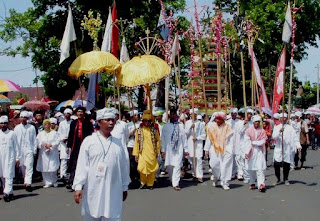Tradisi Islam Nusantara Dan Gambarnya
Dari usaian diatas sikap kita menghadapi berbagai macam tradisi dan upacara kesukuan nusantara adalah menghormati dan memandangnya sebagai kekayaan khazanah budaya yang ada di Indonesia. Seni budaya lokal yang.
Created using PowToon - Free sign up at - Create animated videos and animated presentations for free. PowToon is a free tool that allows you to develop cool animated clips and animated presentations for your website, office meeting, sales pitch, nonprofit fundraiser, product launch, video resume, or anything else you could use an animated explainer video.
PowToon's animation templates help you create animated presentations and animated explainer videos from scratch. Anyone can produce awesome animations quickly with PowToon, without the cost or hassle other professional animation services require.
Indonesian Muslim men wearing and standing in.Islam Nusantara or Indonesian (Islamic) model is a distinctive brand of developed in at least since the 16th century, as a result of interaction, contextualization, indigenization, interpretation and vernacularization of universal Islamic values, according to reality of. The term was first officially coined, proposed and promoted by Indonesian Islamic organization in 2015, as an alternative for interpretation and representation of that currently dominated by Arabic or Middle Eastern perspectives.Islam Nusantara is defined as an interpretation of Islam that takes into account local Indonesian customs in forming its. On June 2015, Indonesian President has openly expressed his support for Islam Nusantara, which in his view is the moderate form of Islam compatible to Indonesian cultural values. Indonesian traditional Quranic school.The was a slow, gradual and relatively peaceful process. One theory suggests it arrived directly from before the 9th century, while another credits merchants and preachers for bringing Islam to Indonesian islands in the 12th or 13th century either from in or directly from the. By the 16th century, Islam began to supplant Hinduism and Buddhism as the major faith in the archipelago.
The traditional Islam were mainly belongs to branch, taught by revered clerics called in boarding school, especially in Java. Some aspects of traditional Islam in Indonesia has incorporated local culture and customs.Early practice of Indonesian Islam were more or less influenced by Sufism and existing local Javanese spiritualism. Several traditions, such as revering and recognizing the authority of kyai, honoring prominent Islamic figures such as, also took part in Islamic traditions such as (tomb pilgrimage), ( ceremony to send the spirit of deceased one to the afterworld), and (commemorating the prophet Muhammad's birthday) including Javanese ceremony, were observed diligently by traditionalist Muslims in Indonesia. However, after the incoming of followed by from Arabia, the scriptural Islamic puritans denounced those traditions as or, deprecated as a form of that corrupted the purity of Islam.
This condition has led to the ongoing religious dispute, uneasy coexistence and somewhat a spiritual rivalry, between traditionalist Nahdlatul Ulama and modernist puritan. Visiting the tomb of prominent Islamic figure.Examining the destruction of the war-torn Middle East; the, the Iraq War and the, Indonesian moderate Islamic scholar noticed that some of this conflict were having religious aspect, especially the problem of. Indonesia also has suffered several that were launched by Islamist group such as 's. The ultra conservative doctrine of and adhered and promoted by the state of has been dominated the global discourse of Islam for decades. The wary sentiments were aggravated further by the advent of in 2013 that performed abhorred war crimes in the name of Islam.In recent years, there are the rise of fundamentalism and religious intolerance in Indonesia. Internally, some of foreign and local organizations, such as (HTI), (FPI) also Islamist political party such as (PKS) has been actively involved in Indonesian politics in recent years, undermining the traditionalist Islamic institution especially Nahdlatul Ulama. Those Islamist elements in Indonesian politics were suspiciously regarded as weakening and harming the state ideology.Indonesian moderate Muslim scholars, especially those traditionalist of Nahdlatul Ulama background, suggests Indonesian Muslims to distinct and differ between the and the traditional practice of.
Compared to their Middle East Muslims counterpart, Indonesian Muslims has enjoyed a relative peace and harmony for decades. This was owed to Indonesians interpretation of Islam which is more moderate, inclusive and tolerant. Indonesia — as the world's largest Muslim population, could to contribute to the evolution of Islamic world, by offering its brand of Islam as an alternative to Saudi's Wahhabism. Thus subsequently, Islam Nusantara was identified, formulated, coined and promoted.Characteristics. Boys and girls students are studying together in their classroom.The main traits of Islam Nusantara are tawasut (moderate), rahmah (compassionate), anti-radical, inclusive and tolerant. Tawasut by 'moderate' here connotes the Sunni Islamic theological position of rather than political position.
In its relations to local culture, Islam Nusantara uses a sympathetic cultural approach on teaching Islam; it did not destroy, disrupt or supplant the native culture, but on the contrary embraces, honor, nurture and preserves local culture. One of the main characteristic of Islam Nusantara is the consideration of local Indonesian culture in forming their fiqh (Islamic jurisprudence).Islam Nusantara was developed locally in indigenous educational institution of traditionalist boarding school. As the result, it based on traditional eastern decorum and mannerism; it emphasized in honoring the status and authority of kyai or ulama (religious teacher). The students requires the ongoing guidance of their religious teacher, in order not to go astray or developing false or radical ideas. Another distinctive aspect, is the emphasize on Rahmatan lil Alamin (blessings for the universe) as Islamic universal value, which promote peace, tolerance, mutual respects and a somewhat outlook in regard of Islamic interactions within (within Muslim community) and in inter-religions relations. Criticism Islam Nusantara has been fiercely opposed and criticized by other branches of Islam, especially by adherents of and, or other similar doctrines that seeks to 'purify' Islam from any 'un-Islamic' local elements, which are often condemned as. Hizbut Tahrir Indonesia, PKS and FPI has openly opposed the Islam Nusantara.
Islam Nusantara has been criticized as a somewhat form of Islam, which undermine the 'perfectness' and singularity of Islam and corrupted the unity of ummah., another influential Islamic organization in Indonesia — although not directly opposed to the concept, has stressed that the term Islam Nusantara should be addressed cautiously and proportionally, not to undermine and repress other branches of Islam, different understandings, or other doctrines of Islam. If Islam Nusantara is favoured, adopted, elevated and promoted by the state, they feared that other Islamic branches would suffer persecution and discrimination. See also.
Nahdlatul Ulama (in Indonesian). 22 April 2015.
^ Azis Anwar Fachrudin (24 July 2015). The Jakarta Post. ^ Heyder Affan (15 June 2015). BBC Indonesia (in Indonesian). Nina Nurmila (2013-01-31).
Jajat Burhanudin, Kees van Dijk (ed.). Amsterdam University Press. P. 109.
(www.dw.com), Deutsche Welle. DW.COM (in Indonesian). Retrieved 2018-08-15.
Ahmad Saifuddin. NU Online (in Indonesian). Retrieved 2018-08-15. Caruso, Phil (6 February 2018). Middle East Institute. Retrieved 2018-08-15.
Fauzi M. Middle East Policy Council. Retrieved 2018-08-15. Vajra Reza Alam (17 January 2017). The Jakarta Post. Retrieved 2018-08-15. Thompson, Neil (17 November 2017).
The Diplomat. Retrieved 2018-08-15. Syahirul Alim (13 July 2018). Kumparan (in Indonesian).
Islam Nusantara Pdf
Retrieved 2018-08-15. Indonesia Investments. Retrieved 2018-08-15. Cultura & Culture (in Italian). Burhani, Najib.

Al-Tawassuṭ wa-l I‘tidāl: The NU and Moderatism in Indonesian Islam. Asian Journal of Social Science, 2012, p.564. Nahdlatul Ulama (in Indonesian). 16 July 2016. Era Muslim (in Indonesian). 15 June 2015.
Marniati (8 July 2015). Republika (in Indonesian).External links.
